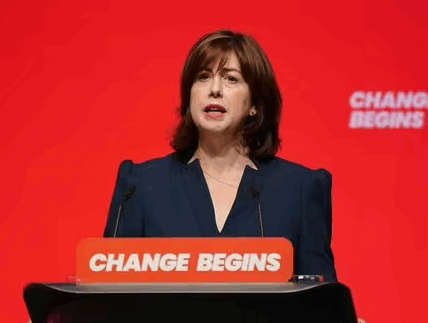As high streets across the country struggle, this town’s decline has been particularly brutal.

Shops are boarded up along the street. (Image: Jonathan Buckmaster)
Walk down Chatham High Street at midday and the decline it faces is so stark and unavoidablethat it feels less like a town centre and more like a warning.
Here you can see what happens when budgets tighten, business crumbles and the streets empty out leaving the only trade still reliably turning a profit in full view of passing shoppers.
Barely five minutes from the railway station, where trains carry commuters to central London in little more than half an hour, the High Street reveals itself almost immediately.
Graffiti is slapped across walls and shops are boarded up, vagrancy is rife, and daytime drinking is on full display. Just metres from the station, two men drink cheap cider from cans and discard their empties in the middle of the pavement.
Then there is the sight no thriving town should ever accept as normal. Two sex workers, standing on the busiest stretch of the pavement, openly touting for business. They are not hiding in alleyways or near taxi ranks, but here in the middle of the High Street, beside families doing their shopping.
A local woman tells the Express simply that they are “always there”.
The picture is bleak, and yet it takes only a few minutes to understand why.
Shops have closed and footfall has collapsed. Rates have climbed while customers’ income has thinned out, and left less to be spent over the counter. And the Autumn Budget, scheduled for November 26, looms over this exhausted stretch of Kent like another storm cloud waiting to break.
Tax rises are widely expected and whilst the Treasury does not comment on Budget speculation, nobody here is waiting to see what happens, as they fear they already know.
It is a pattern repeated across the country but perhaps nowhere quite as vividly, or as starkly, as in Chatham.
Once a proud town with a bustling commercial centre, its High Street now feels like a place slowly slipping out of the national conversation. Businesses here talk of survival, not growth. They mutter about fewer staff and vanishing trade and they despair about a town on the edge.
And in almost every shop you step into, the story is the same.
Halfway down the High Street, past the first of the boarded shopfronts, sits TV World Ltd. It’s been operating here for over 30 years and its owner, David Frais, 61, has been behind the counter through nine Prime Ministers, a recession, a pandemic and several rounds of high-street “regeneration” schemes that promised change and delivered little.
He is polite but clearly frustrated. His shop, once busy enough to employ a team of 11 staff, now feels like a survivor. A single customer browses through a collection of the latest TV sets, and behind his counter boxes of appliances sit neatly stacked. But behind the careful presentation is a devastating truth.
“In the first six months of this year we dropped £60,000 in turnover,” he tells the Express. “The high street, well, what’s left of it, took a huge kicking in the last Budget. Reeves putting up National Insurance and the minimum wage just led us to shed jobs. I used to have 11 staff here, now I have four.”
There is no hesitation in his voice, just dissappointment. “Labour basically doubled business rates when they came in,” he says. “Reeves has been sleepwalking into spending.”
At no point does he soften his words. “She is running the country like an amateur,” he says. “Labour are embarrassing.”
For Mr Frais, the fear is quite practical. If the Budget raises taxes again, his margins will sink further. Customers already have less money in their pockets. The town’s decline means passers-by no longer linger. The High Street, he says, cannot take another blow.
“This will be the worst Christmas on record,” he predicts. “All of us on the street are not happy. Everyone is hurting.”

Simon Ball has been working in the town for decades (Image: Jonathan Buckmaster)
A few doors down is Pet Aqua, owned by Simon Ball, 53, another business that has survived more than three decades on this increasingly fragile street.
When we arrive, he is serving a customer choosing insects for a pet lizard. The shop is brightly lit and spotlessly clean, and Mr Ball is proud to show us around the store.
But the pressure is clearly there, hidden just beneath the surface. “Labour promised to cut business rates when they came into power,” he says. “But they doubled them.”
“We have suffered because of tax hikes,” he explains. Like Mr Frais, he lists the same culprits: National Insurance changes, higher costs and Income Tax-squeezed customers.
“There’s shops going under on the high street because of the increase in National Insurance,” he says. He pauses when asked about his view of politicians. “Politicians? They’re all as bad as each other.”
He doesn’t say it with anger, but like someone who has been worn down by years of seeing one set of promises replaced by another.

The High Street has lost footfall (Image: Jonathan Buckmaster)
Back outside, the atmosphere teeters between tense and tired. As we continue walking down the High Street, a commotion breaks out between two women and a man. The man hurls an empty can towards them, shouting a string of words unprintable on this website.
The women shout back in a similar vein. They later tell us he did not “agree to pay”.
It is mid-afternoon. Mums are pushing prams down the road, one appears to be masterfully navigating a pram, two dogs and a child battling with a balloon. She steers her family away from the scene by stepping across the road.
This is the new reality of Chatham. The only trade that appears to be growing is one most towns would prefer to pretend does not exist. And if the sex workers do not shock the regulars, the casual street drinking, the shouting, the aggressive begging and the boarded-up shops certainly do.
Residents talk about avoiding the High Street after school hours. An elderly couple tells us they “leave before the schools kick out” because things “get worse” in the afternoon.
The sense is sadly unmistakable, this is a town buckling under the weight of too many problems at once.

Desiree Nurse provides support for cancer patients (Image: Jonathan Buckmaster)
At the far end of the High Street, as if standing guard over the street’s last reserve of optimism, sits Cleopatra’s Hair Salon. Inside, its owner, Desiree Nurse, 51, greets customers with a warmth that feels almost startling after the walk down the street.
Her shop is beautifully kept and it doubles as a small community hub, providing hair services, mastectomy support for cancer patients and free health checks. In a street hollowed out by closures, Cleopatra’s feels like something of a sanctuary.
But Ms Nurse is under no illusion about what is happening outside her door.
“For us, what we need is more support for the high street,” she says. “Money for safety on the high street, like more police.”
She is measured in her comments, and does not dismiss higher taxation.
“Taxes pay for everything,” she says. “But they must be proportional to your earnings. It would help, though, if small business rates were kept down.” Her view on employment costs is blunt. “High employers NICs is really hurting.”
She does not shout and nor does she complain. But her words carry the weight of experience born from years of working at the end of town. Her business is one of the few still standing and she can see the decline happening in real time.
The more you walk, the more Chatham reveals itself not as a place in sudden crisis but a place worn down by years of slow decline. The boarded-up frontages are not temporary, and even the “To Let” signs have faded.
Sadly, the daytime drinkers are part of the landscape, the sex workers are part of it too. The noise, the interruptions, the occasional shouting match; these are no longer anomalies, they are features.
This is what happens when a High Street loses its heart. The businesses that remain feel like holdouts in a long retreat, And looming over them is the Autumn Budget on, a date spoken about on Chatham High Street with a sense of dread.
Traders here fear that further rises in business costs or employer taxation will hammer them again, at a time when their customers can least afford it. Most believe they are already operating at the edge, and that any further tightening could tip them over.

Shops are closing down. (Image: Jonathan Buckmaster)
Perhaps the most heartbreaking part of Chatham’s decline is its sense of inevitability. People here do not expect rescue, all they expect is more pressure.
“Chatham does not need to be hit even more,” says Mr Frais. “[Labour] do not have a clue how to run the country.” The comments are delivered with a real sense of someone who has watched their street deteriorate year after year whilst still soldiering on.
This is a town many of the locals can remember as being a place that shoppers from across the county made a day of visiting. Now its High Street is a corridor of closures, poverty, and a desperation that never quite leaves the air.
What remains are the people stoically holding on, the shopkeepers who open every morning out of a sheer love of what they do, and a desire to keep on going.
The small businesses that still offer help, support and service even when their own costs rise beyond reason. They are the ones who keep the lights on. But even they are not sure how much longer they can manage.
Everyone we speak to repeats the same line, ‘everyone is hurting’.
And if Chatham is any indication of Britain’s future, the question is no longer whether the High Street will decline, but how much further it can fall.

